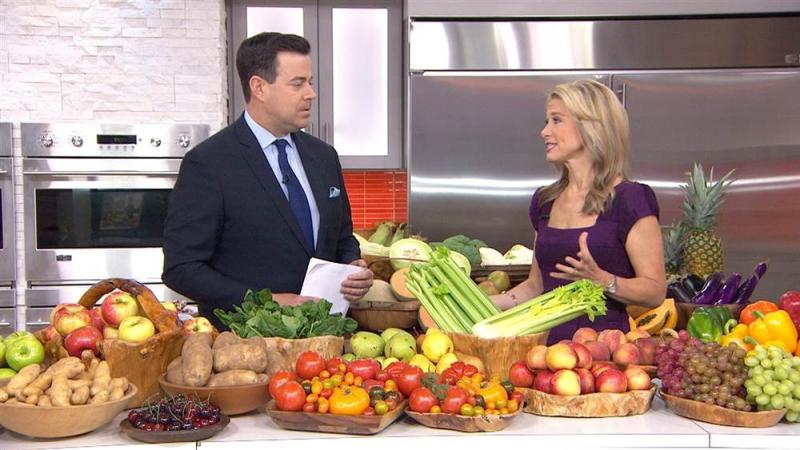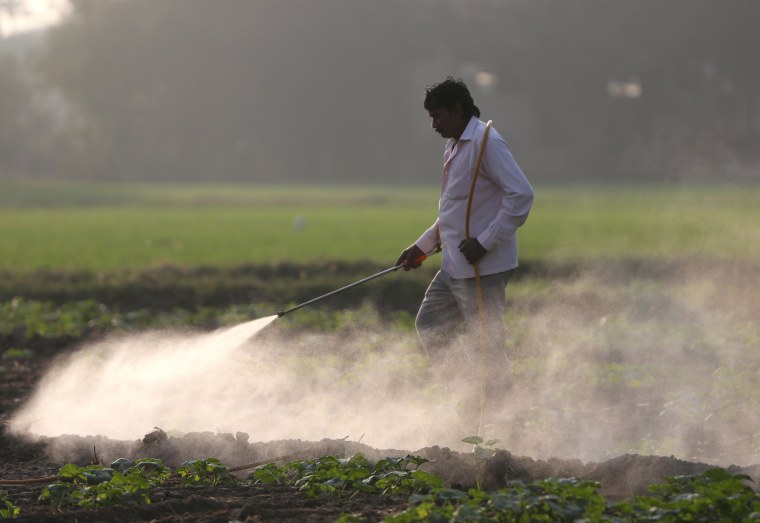Mideast farmers who use pesticides often find no buyers abroad



AL-KARAMEH, Jordan — Farmers in the Middle East and North Africa are facing roadblocks exporting their crop to Western countries because of the pesticides they use. This is despite the fact many of these chemicals are manufactured by companies based in Europe and North America.
Sameer Mahadin said he had to leave his tomatoes to rot in the ground at this farm on the south end of the Dead Sea in Jordan because it wasn't worth the labor to harvest them.
The increasingly dry climate has forced him to rely more on irrigation, fertilizers and chemicals to maintain strong yields, he said. But that also has limited his ability to sell them abroad.
Compounded with the war in neighboring Syria — a market he used to rely on with similar pesticide policies to Jordan's — and he accrued more than $210,000 in debt in just one season.
The use of pesticides globally isn't slowing, according to Jules Pretty, a professor of environment and society at the University of Essex in England. The ease of getting rid of pests and diseases and the potential to increase yields significantly outweigh the negative effects for individual farmers.
Every year, 7.7 billion pounds of active ingredients are used, Pretty said. That's despite the fact the chemicals can cause a range of environmental and health problems from deadly poisoning of farm workers to longer-term effects on the immune system from exposure to residues, according to the World Health Organization .
 A farmer sprays pesticides at a cucumber field near Ahmedabad, India. AMIT DAVE / Reuters
A farmer sprays pesticides at a cucumber field near Ahmedabad, India. AMIT DAVE / Reuters The U.S., China and Argentina — making up nearly a quarter of the world's population — are the largest consumers by volume of pesticides, accounting for 70 percent of the $45 billion global market.
But while a study published last year found that countries in the Middle East and North Africa are in a "prime location" to export food to Europe, many are unable to meet safety standards.
Poorer countries don't manufacture pesticides locally. They are either made by Western companies that have the expertise or if a chemical's patent is expired, they are often produced by manufacturers in India or China.
There is a global standard, the Codex Alimentarius , that serves as a baseline for ensuring food safety and creates fairness in international trade. But individual countries and regions still set their own standards, which can be more rigorous than the codex and result in discrepancies.
Chlorpyrifos , a pesticide widely used in farming, is one example of such uneven policies. The U.S. government is appealing a federal court order banning its use , but it is legal in Jordan and other countries.
Read more at the seeded content



I have been very careful with buying my fish, but I never thought about my produce. Something to begin to consider.
Anything labeled "USDA Organic" is guaranteed to be pesticide free.
I prepare most of my meals at home, so then I eat 100% Organic. Its healthier,and often saves money. (It saves money because I shop for food almost exclusively at Whole Foods-- and use an Amazon Credit Card. (There are also additional discounts for members of Amazon Prime).
However, if you are thinking of buying some non-Organic produce, note that some foods are not contaminated with pesticides as much as others. You can google two lists-- here's one such site: The "Dirty Dozen" and the "Clean 15.
Fish and Seafood: one of the main problems can be Mercury. There are online lists of which fish are lowest. (Generally speaking those lower down the food chain have less Mercury. If you don't know which specific ones have less, the general rule is that smaller ones have less). Wild caught Pacific Salmon is excellent-- farm raised can be toxic!
Seafood is the opposite-- farm raised is generally better.
*One exception re: Organic: Food from China that is labeled "Organic" may not be really organic.
And the actual numbers of cancer victims have not changed in our lifetime, just the survival rate is much better. Same thing with autoimmune and neurological diseases.
Yes and now that Trump's EPA has removed the regulations on mercury emissions we can look forward to much more mercury being dumped into the water table.
If I catch a Salmon in our local creek, I can't eat it more than once a MONTH...
Especially now that the President has shut down the government.
We should not have to pay more to have food that won't poison us.
Well,isn't it time you wised up and stopped?
I used to do that as well-- but stopped years ago
USDA Organic guarantees that you pay more and that's about it.
And you know this...how?
What does the USDA Organic label actually mean?
What are the penalties for mislabeling non-Organic food as organic?
I wouldn't really trust those labels.
See my comment 1.1.9, below.
And the actual numbers of cancer victims have not changed in our lifetime
Are you saying the population has not grown in our lifetime?
(Because if the percentage with cancer has remained the same,but the population (Total number of people) has grown-- then the actual total number of people with Cancer has increased). I think it might be more useful to look at the percentage of people with cancer.
I do not know if that's grown, but my guess is that the rate of Cancer has increased.
Due to more toxins in the air water--and food. Also worsening diet (mainly the Yuge increase in sugar consumption as well as artificial sweetners.) Then there's the obesity epidemic, as well as decreasing amount of exercise. Etc. And greatly increased time spentin front of electronic devices from cell phonesto computers.
In the conservative mind set there's nothing that can be done. Corporate profits will suffer if they go organic so their masters have programmed them to believe that organic is loony hippie stuff. ALL HAIL MONSANTO !!!
Fruits are often loaded with pesticides. Peel them or buy organic when you can.
Good point!
Of course the reality is that you can't' avoid toxic chemicals 100%.
But its smart to do what you can.
Actually nature has provided our bodies with ways of dealing with moderate amounts of toxins. Our bodies has ways of dealing with moderate amounts, But its when there are excessive overloads that problems begin. And in the modern world there are more and more chemical used, some of which are harmful l to various degrees. So IMO it pays to take some steps to minimize exposure.
(For example only buy canned food in BPA free cans. Although I almost never eat anything that comes in a can. The worst is tomato products in most cans.
And if you want to go to extremes and enjoy worrying-- even if produce was grown without any toxins---in some areas the rainwater has minute amounts of toxic chemicals. So does the air-- you does some new furniture, carpeting , etc. You can't avoid them totally nor do you have too.
Even in nature-- some soils have naturally occuring Radon...
Generally speaking, eating more fruits and vegetables helps de-toxify your body to some degree. Spirulina, Chlorella and fresh Cilantro are supposedly natural dextoxifiers.
Peel the organic too......
See the two lists (links in comment 1.1.1).